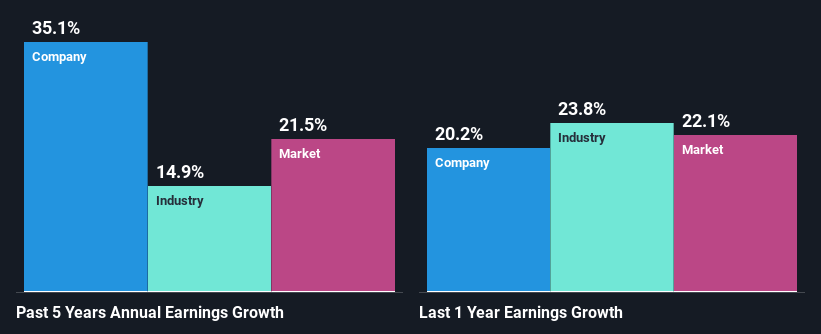Stock Analysis

It is hard to get excited after looking at Beta Drugs' (NSE:BETA) recent performance, when its stock has declined 17% over the past three months. However, a closer look at its sound financials might cause you to think again. Given that fundamentals usually drive long-term market outcomes, the company is worth looking at. In this article, we decided to focus on Beta Drugs' ROE.
Return on equity or ROE is an important factor to be considered by a shareholder because it tells them how effectively their capital is being reinvested. In other words, it is a profitability ratio which measures the rate of return on the capital provided by the company's shareholders.
Check out our latest analysis for Beta Drugs
How Is ROE Calculated?
The formula for ROE is:
Return on Equity = Net Profit (from continuing operations) ÷ Shareholders' Equity
So, based on the above formula, the ROE for Beta Drugs is:
24% = ₹348m ÷ ₹1.4b (Based on the trailing twelve months to September 2023).
The 'return' is the profit over the last twelve months. Another way to think of that is that for every ₹1 worth of equity, the company was able to earn ₹0.24 in profit.
What Has ROE Got To Do With Earnings Growth?
We have already established that ROE serves as an efficient profit-generating gauge for a company's future earnings. We now need to evaluate how much profit the company reinvests or "retains" for future growth which then gives us an idea about the growth potential of the company. Generally speaking, other things being equal, firms with a high return on equity and profit retention, have a higher growth rate than firms that don’t share these attributes.
Beta Drugs' Earnings Growth And 24% ROE
At first glance, Beta Drugs seems to have a decent ROE. Especially when compared to the industry average of 13% the company's ROE looks pretty impressive. This certainly adds some context to Beta Drugs' exceptional 35% net income growth seen over the past five years. However, there could also be other causes behind this growth. For example, it is possible that the company's management has made some good strategic decisions, or that the company has a low payout ratio.
As a next step, we compared Beta Drugs' net income growth with the industry, and pleasingly, we found that the growth seen by the company is higher than the average industry growth of 15%.

The basis for attaching value to a company is, to a great extent, tied to its earnings growth. What investors need to determine next is if the expected earnings growth, or the lack of it, is already built into the share price. By doing so, they will have an idea if the stock is headed into clear blue waters or if swampy waters await. If you're wondering about Beta Drugs''s valuation, check out this gauge of its price-to-earnings ratio, as compared to its industry.
Is Beta Drugs Efficiently Re-investing Its Profits?
Beta Drugs doesn't pay any dividend to its shareholders, meaning that the company has been reinvesting all of its profits into the business. This is likely what's driving the high earnings growth number discussed above.
Summary
Overall, we are quite pleased with Beta Drugs' performance. In particular, it's great to see that the company is investing heavily into its business and along with a high rate of return, that has resulted in a sizeable growth in its earnings.
Valuation is complex, but we're helping make it simple.
Find out whether Beta Drugs is potentially over or undervalued by checking out our comprehensive analysis, which includes fair value estimates, risks and warnings, dividends, insider transactions and financial health.
View the Free AnalysisHave feedback on this article? Concerned about the content? Get in touch with us directly. Alternatively, email editorial-team (at) simplywallst.com.
This article by Simply Wall St is general in nature. We provide commentary based on historical data and analyst forecasts only using an unbiased methodology and our articles are not intended to be financial advice. It does not constitute a recommendation to buy or sell any stock, and does not take account of your objectives, or your financial situation. We aim to bring you long-term focused analysis driven by fundamental data. Note that our analysis may not factor in the latest price-sensitive company announcements or qualitative material. Simply Wall St has no position in any stocks mentioned.
About NSEI:BETA
Beta Drugs
Beta Drugs Limited develops, manufactures, and trades in oncology medicines in India.
Flawless balance sheet with acceptable track record.

